CIBBR NEWS ARCHIVE
 Friday, April 04, 2025UNH repurposed its COVID testing lab to serve the state — and science — in new waysDavid Needle has 900 samples of moose poop. “As one does,” quips the senior veterinary pathologist at UNH’s New Hampshire Diagnostic Veterinary Lab. Those stinky artifacts can reveal what moose ate, whether they’re pregnant, how healthy or stressed they are — all important data points to help us understand and protect this iconic Northern New England species. But accessing that data takes...
Friday, April 04, 2025UNH repurposed its COVID testing lab to serve the state — and science — in new waysDavid Needle has 900 samples of moose poop. “As one does,” quips the senior veterinary pathologist at UNH’s New Hampshire Diagnostic Veterinary Lab. Those stinky artifacts can reveal what moose ate, whether they’re pregnant, how healthy or stressed they are — all important data points to help us understand and protect this iconic Northern New England species. But accessing that data takes... Sunday, September 14, 2025A UNH researcher will work to advance our understanding of chemical changes in RNA molecules and train STEM workforce in innovative RNA technologies, thanks to a major new grant from the National Science Foundation. Harish Vashisth, professor of chemical engineering and bioengineering at the University of New Hampshire, has been awarded $780,000 to investigate the role of chemical modifications...
Sunday, September 14, 2025A UNH researcher will work to advance our understanding of chemical changes in RNA molecules and train STEM workforce in innovative RNA technologies, thanks to a major new grant from the National Science Foundation. Harish Vashisth, professor of chemical engineering and bioengineering at the University of New Hampshire, has been awarded $780,000 to investigate the role of chemical modifications... Tuesday, February 18, 2025Scientists explore antifreeze proteins to improve cell and tissue preservationResearch Goals Found widely in nature, including in fish, plants, fungi and insects, antifreeze proteins (AFPs) inhibit the growth of ice crystals by binding to ice surfaces. By studying the mechanisms that enable AFPs to bind ice and affect its properties, University of New Hampshire researchers are examining how these proteins could improve modern cryopreservation methods for preserving cells...
Tuesday, February 18, 2025Scientists explore antifreeze proteins to improve cell and tissue preservationResearch Goals Found widely in nature, including in fish, plants, fungi and insects, antifreeze proteins (AFPs) inhibit the growth of ice crystals by binding to ice surfaces. By studying the mechanisms that enable AFPs to bind ice and affect its properties, University of New Hampshire researchers are examining how these proteins could improve modern cryopreservation methods for preserving cells... Thursday, August 01, 2024Nate Oldenhuis, Linqing Li RecognizedIn a significant boost to biomedical research and ultimately human health outcomes, University of New Hampshire professors Linqing Li and Nate Oldenhuis have been awarded nearly $4 million from the National Institutes of Health (NIH) for research that will advance wound healing and tissue generation. Nate Oldenhuis Nate Oldenhuis Oldenhuis, an assistant professor in chemistry, plans to...
Thursday, August 01, 2024Nate Oldenhuis, Linqing Li RecognizedIn a significant boost to biomedical research and ultimately human health outcomes, University of New Hampshire professors Linqing Li and Nate Oldenhuis have been awarded nearly $4 million from the National Institutes of Health (NIH) for research that will advance wound healing and tissue generation. Nate Oldenhuis Nate Oldenhuis Oldenhuis, an assistant professor in chemistry, plans to...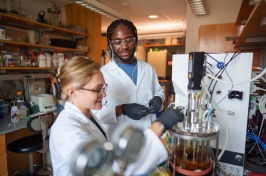 Wednesday, September 27, 2023National Institutes of Health Phase 2 award will accelerate innovative human health research at UNHThe University of New Hampshire’s Center of Integrated Biomedical and Bioengineering Research (CIBBR) has been granted a second $10 million award from the National Institutes of Health (NIH), enabling the center to continue advancing cutting-edge interdisciplinary research and foster innovation in the biomedical and bioengineering sciences to tackle complex challenges in human health and disease...
Wednesday, September 27, 2023National Institutes of Health Phase 2 award will accelerate innovative human health research at UNHThe University of New Hampshire’s Center of Integrated Biomedical and Bioengineering Research (CIBBR) has been granted a second $10 million award from the National Institutes of Health (NIH), enabling the center to continue advancing cutting-edge interdisciplinary research and foster innovation in the biomedical and bioengineering sciences to tackle complex challenges in human health and disease...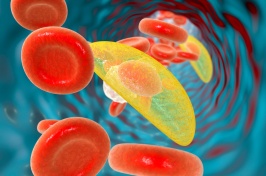 Wednesday, June 21, 2023New research investigates genetic “switches” of toxoplasmosis parasiteKey Finding The protein bromodomain protein 1 (or BDP1) plays a key role gene regulation to allow the parasite Toxoplasma gondii to infect and cause disease in its host. Key Terms Bromodomain protein 1 (or BDP1): A protein in Toxoplasma and related parasites that contains a bromodomain which gives it the ability to "read" marks on the genome and control gene expression. Cryptosporidium...
Wednesday, June 21, 2023New research investigates genetic “switches” of toxoplasmosis parasiteKey Finding The protein bromodomain protein 1 (or BDP1) plays a key role gene regulation to allow the parasite Toxoplasma gondii to infect and cause disease in its host. Key Terms Bromodomain protein 1 (or BDP1): A protein in Toxoplasma and related parasites that contains a bromodomain which gives it the ability to "read" marks on the genome and control gene expression. Cryptosporidium... Thursday, May 11, 2023UNH biomedical and bioengineering researchers explore innovative solutions to complex health conditionsScientific discoveries made by biomedical and bioengineering researchers at UNH over the past five years are transforming how a range of complex health conditions — from cancer and chronic wounds to neurological disorders such as Alzheimer’s and Parkinson’s — are being diagnosed, treated and prevented. Find this story and more in the latest issue of Spark, UNH’s annual research review, now live...
Thursday, May 11, 2023UNH biomedical and bioengineering researchers explore innovative solutions to complex health conditionsScientific discoveries made by biomedical and bioengineering researchers at UNH over the past five years are transforming how a range of complex health conditions — from cancer and chronic wounds to neurological disorders such as Alzheimer’s and Parkinson’s — are being diagnosed, treated and prevented. Find this story and more in the latest issue of Spark, UNH’s annual research review, now live...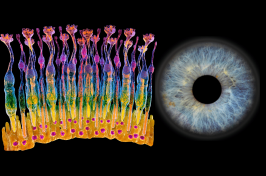 Tuesday, December 06, 2022New National Eye Institute grant supports research into degenerative eye diseasesA recently awarded $1.5 million grant from the U.S. National Institutes of Health’s (NIH) National Eye Institute will support ongoing research into retinal degenerative diseases led by Rick Cote, a professor in the molecular, cellular and biomedical sciences department and the director of the Center of Integrated Biomedical and Bioengineering Research (CIBBR) at UNH. This latest grant extends...
Tuesday, December 06, 2022New National Eye Institute grant supports research into degenerative eye diseasesA recently awarded $1.5 million grant from the U.S. National Institutes of Health’s (NIH) National Eye Institute will support ongoing research into retinal degenerative diseases led by Rick Cote, a professor in the molecular, cellular and biomedical sciences department and the director of the Center of Integrated Biomedical and Bioengineering Research (CIBBR) at UNH. This latest grant extends...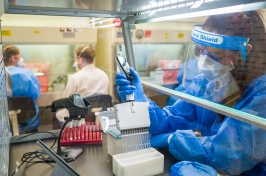 Wednesday, July 13, 2022With NIH grant, UNH will help understand COVID-19 variantsAs COVID variants march steadily through the Greek alphabet, UNH has received new funding from the National Institutes of Health to continue its genomic surveillance of COVID-19 variants in New Hampshire. The work could lead to better understanding of how specific variants increase transmissibility of the virus, evade the immune systems of those previously infected or increase severity of...
Wednesday, July 13, 2022With NIH grant, UNH will help understand COVID-19 variantsAs COVID variants march steadily through the Greek alphabet, UNH has received new funding from the National Institutes of Health to continue its genomic surveillance of COVID-19 variants in New Hampshire. The work could lead to better understanding of how specific variants increase transmissibility of the virus, evade the immune systems of those previously infected or increase severity of...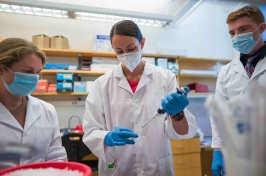 Tuesday, June 21, 2022Nutrition researcher named a faculty fellow in a National Heart, Lung, and Blood Institute funded programNutrition researcher Maria Carlota Dao, an assistant professor at the UNH College of Life Sciences and Agriculture and a New Hampshire Agricultural Experiment Station (NHAES) researcher, was recently selected as a faculty fellow with the Obesity Health Disparities Programs to Increase Diversity Among Individuals Engaged in Health-Related Research (OHD PRIDE) program at the University of Houston....
Tuesday, June 21, 2022Nutrition researcher named a faculty fellow in a National Heart, Lung, and Blood Institute funded programNutrition researcher Maria Carlota Dao, an assistant professor at the UNH College of Life Sciences and Agriculture and a New Hampshire Agricultural Experiment Station (NHAES) researcher, was recently selected as a faculty fellow with the Obesity Health Disparities Programs to Increase Diversity Among Individuals Engaged in Health-Related Research (OHD PRIDE) program at the University of Houston....
